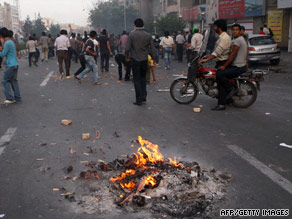
Iranian opposition leader Mir Hossein Moussavi and reformist former President Mohammad Khatami on Sunday blasted the trials of people arrested in post-election demonstrations.
Those on trial had been tortured into confessions, Moussavi said in a statement posted on his Ghalam News Web site. “They have been stepped on so severely that they would have confessed to anything else, had they been instructed to do so,” Moussavi said. Nearly 100 Iranians arrested in the aftermath of the disputed June 12 presidential elections went on trial Saturday, two Iranian news agencies reported. In addition, another 10 people went on trial Sunday, according to Iran’s government-funded Press TV, citing the Iranian Students News Agency (ISNA). Khatami blasted the trials as an “insult” to Iran and Islam.
Don’t Miss
In Depth: Iran election fallout
“Such play-acting … damages the system and reduces public trust,” he said in a statement provided by his office. Meanwhile, Hojatoleslam Mohammad Taghi Rahbar, a member of parliament’s Judicial Commission, on Sunday accused Moussavi and Khatami of being the main leaders of the recent disturbances. “A complaint … regarding the extremist and destructive behavior of Moussavi has been handed to the judiciary and we hope that the judiciary would take up this case quickly,” he said, according to the semi-official Fars News Agency. Khatami said the trials were unconstitutional, contrary to “the law and the rights of citizens,” and that the real crimes had been committed by the authorities. Khatami condemned “the atrocities committed at certain detention centers as well as those committed during arrests which, in some cases, resulted in murder.” He dismissed the reported confessions of the accused, as did another influential ex-president, Ali Akhbar Hashemi Rafsanjani, according to Press TV. Iran’s Expediency and Discernment Council — essentially an advisory board to the supreme leader that is chaired by Rafsanjani — also stated that the allegations that Moussavi, Khatami and Rafsanjani conspired to fuel the post-election unrest are “essentially wrong and refutable,” the semi-official Iran Student Correspondent Association reported. Among the charges the detainees are facing are: Attacking military facilities using firearms and firebombs Attacking government facilities and setting fire to them Destruction of public property Creating panic in public Beating up members of the security forces Among the nearly 100 defendants are several members of the reformist Mosharekat Party and a member of the central committee of the Kargozaran Party, which is close to Rafsanjani, Farsf reported. On Sunday, “10 other suspects were put on trial in a closed court session,” ISNA quoted a judiciary official as saying, according to Press TV. There were no “known” political activists among the 10 defendants, ISNA said, as the 10 were arrested in the streets during demonstrations following the election. A member of Parliament’s special committee for monitoring the condition of detainees complained Saturday that the trials began without the committee’s knowledge. “We were given no information,” said Ghodratollah Alikhani, a member of the committee, according to the semi-official ILNA news agency. “Judiciary officials did not tell us anything about these trials.” He added, “The office of Tehran’s prosecutor had earlier said that the court would try a number of people arrested for street demonstrations, but instead reformist activists are being tried.” At the same time Iran was trying the detainees, it released thousands of other prisoners after Supreme Leader Ayatollah Ali Khamenei pardoned them or commuted their prison terms, Fars reported Saturday. “Forty percent of the country’s inmates, who account for around 68,000 people, were liable to the amnesty,” Mohammad Ali Zanjirei, a top official with the State Prisons Organization, told Fars. He said 17,000 out of the 68,000 inmates were freed, and the rest will see their prison terms commuted or be granted leaves in the final months of their sentences. The idea was originally proposed by Judiciary Chief Ayatollah Seyed Mahmoud Hashemi Shahroudi, Fars reported. Khamenei made the amnesty on the feast of Mab’ath, which marks assignment of the Prophet Mohammad to prophethood. An Iranian legislator promised this week that the majority of the roughly 300 detainees arrested during post-election violence will be set free in coming days. Nearly half — 140 — were already freed this week, National Security and Foreign Policy Commission member Hojatoleslam Hossein Ebrahimi told Fars on Thursday. Iran shut down a nonstandard detention center, called Kahrizak, in southern Tehran on Tuesday on Khamenei’s orders, Fars reported. In another development, Mohammad Javanfekr, media adviser to Iranian President Mahmoud Ahmadinejad, resigned. According to Fars, Javanfekr had resigned two weeks ago, but the president has not yet accepted his resignation.